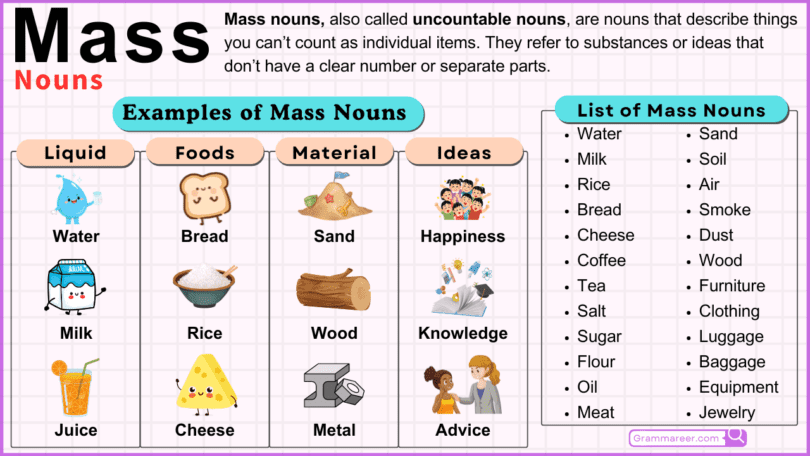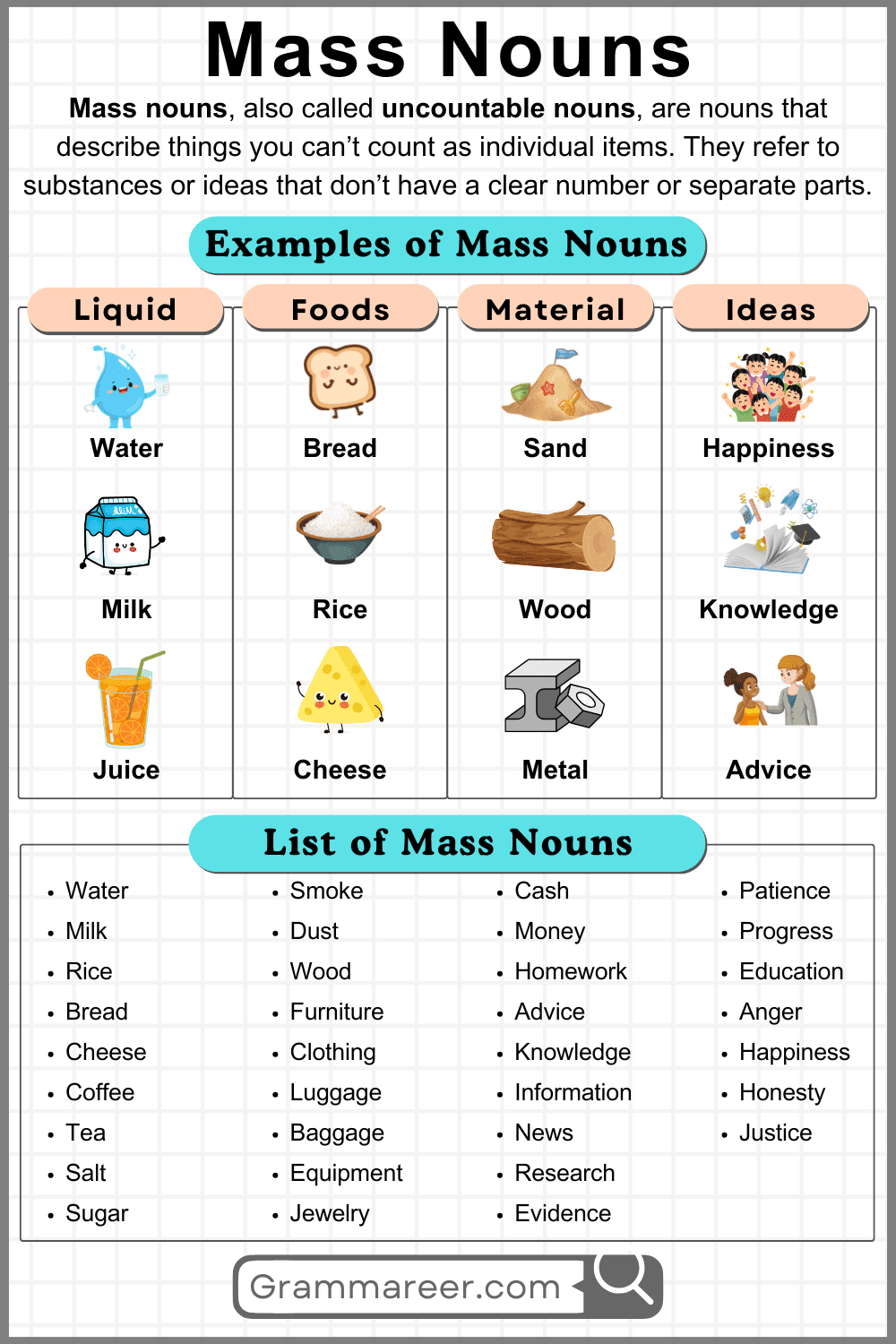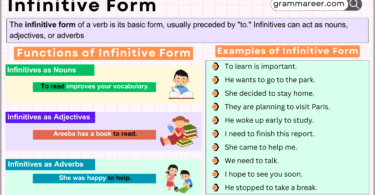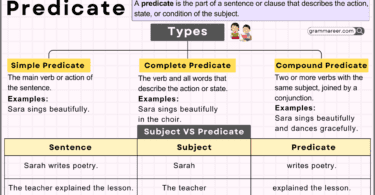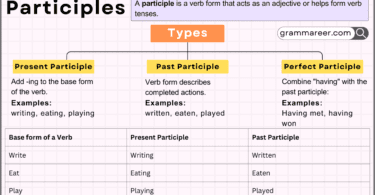Mass nouns, also known as uncountable nouns, represent substances or concepts that cannot be counted as individual units. Unlike countable nouns, which have both singular and plural forms, mass nouns remain in a singular form and don’t use articles like “a” or “an.”
Table of Contents
What Are Mass Nouns?
Mass nouns are words that refer to items or ideas which cannot be counted individually. They usually refer to substances (like water or sugar), abstract concepts (like information or happiness), or collective items (like furniture or equipment). Because of their nature, they don’t have a plural form and can’t be counted directly. To specify quantities, we often use measurements or containers, like “a glass of water” or “a piece of information.”
Examples of Mass Nouns
Mass nouns cover various categories in the English language. Here are some common categories along with examples:
Substances
These represent things that exist in bulk and are often measured in volume or weight.
- Water
- Oil
- Sugar
- Salt
- Rice
- Flour
- Sand
- Wine
- Milk
- Bread
- Butter
- Cement
- Honey
- Meat
- Cheese
- Coffee
- Gasoline
- Soap
- Yogurt
- Paint
Abstract Concepts
Mass nouns also include ideas or concepts that cannot be touched or counted directly.
- Knowledge
- Love
- Happiness
- Freedom
- Information
- Peace
- Honesty
- Strength
- Courage
- Wealth
- Wisdom
- Anger
- Beauty
- Trust
- Justice
- Success
- Power
- Hope
- Pain
- Faith
Collective Items
Some nouns represent items that consist of smaller parts but are seen as a whole.
- Furniture
- Luggage
- Equipment
- Jewelry
- Clothing
- Machinery
- Traffic
- Garbage
- Cutlery
- Baggage
- Stationery
- Crockery
- Money
- Makeup
- Merchandise
- Scenery
- Hardware
- Gear
- Cash
Natural Elements
This category includes natural resources or weather conditions.
- Air
- Fire
- Water
- Snow
- Rain
- Sunshine
- Lightning
- Ice
- Fog
- Hail
- Soil
- Dew
- Thunder
- Gravity
- Energy
- Heat
- Darkness
- Mist
- Steam
- Smoke
List of Mass Nouns
- Water
- Milk
- Rice
- Bread
- Cheese
- Coffee
- Tea
- Salt
- Sugar
- Flour
- Oil
- Meat
- Sand
- Soil
- Air
- Smoke
- Dust
- Wood
- Furniture
- Clothing
- Luggage
- Baggage
- Equipment
- Jewelry
- Cash
- Money
- Homework
- Advice
- Knowledge
- Information
- News
- Research
- Evidence
- Patience
- Progress
- Education
- Anger
- Happiness
- Honesty
- Justice
- Peace
- Safety
- Traffic
- Weather
- Software
- Hardware
- Music
- Literature
- Poetry
- Art
Table of Common Mass Nouns and Quantifiers
| Mass Noun | Quantifier |
|---|---|
| Water | A glass of, a drop of |
| Sugar | A spoonful of, a bag of |
| Rice | A bowl of, a cup of |
| Bread | A slice of, a loaf of |
| Furniture | A piece of, a set of |
| Information | A bit of, a piece of |
| Milk | A bottle of, a gallon of |
| Coffee | A cup of, a pot of |
| Advice | A piece of, a word of |
| Homework | A piece of, an assignment of |
| Luggage | A piece of, an item of |
| Equipment | A piece of, a set of |
| Clothing | An item of, a piece of |
| Meat | A slice of, a pound of |
| Cheese | A slice of, a block of |
| News | A piece of, an item of |
| Jewelry | A piece of, a set of |
| Air | A puff of, a breath of |
| Paper | A sheet of, a piece of |
| Money | A sum of, an amount of |
| Work | A bit of, an hour of |
| Traffic | A bit of, a lot of |
| Time | A bit of, a lot of |
| Music | A piece of, a selection of |
| Grass | A blade of, a patch of |
How to Use Mass Nouns in Sentences
Using these nouns in sentences is straightforward, as they don’t typically have a plural form and are often paired with quantifiers or measurement words. Here’s a guide on how to use mass nouns in sentences with ease.
Using Mass Nouns with Quantifiers
These nouns are often used with words like “some,” “much,” “little,” or “a lot of” to express quantity.
- “There is some water in the bottle.”
- “She has a lot of patience with children.”
- “We don’t have much rice left.”
Using Units of Measure with Mass Nouns
To specify an exact amount, we often add units like “cup,” “piece,” “bottle,” etc., in front of the noun.
- “Can I have a cup of tea?”
- “He bought three bottles of juice.”
- “We need a piece of furniture for the living room.”
Using Mass Nouns in General Statements
When discussing these nouns in general, no specific amount is needed, and quantifiers or units of measure are often unnecessary.
- “Knowledge is important for growth.”
- “Honesty builds strong relationships.”
- “Furniture can be expensive.”
Using Mass Nouns in Negative Sentences
In negative sentences, use “any” or “no” with these nouns to express absence or lack.
- “There isn’t any milk left in the fridge.”
- “She has no furniture in her apartment yet.”
Using Mass Nouns with Adjectives
Adjectives can describe mass nouns just like with count nouns.
- “We need fresh air.”
- “The recipe calls for cold water.”
- “She has immense courage.”
Count vs. Mass Nouns
| Feature | Count Noun | Mass Noun |
|---|---|---|
| Definition | Nouns that refer to individual, countable items. | Nouns that refer to uncountable quantities. |
| Examples | apple, car, book, cat | water, rice, furniture, information |
| Plural Form | Have a plural form (apples, cars) | Do not have a plural form (furniture) |
| Quantifiers | Use many, few, a number of | Use much, little, a quantity of |
| Articles | Use a, an, the | Usually use the, but not a or an |
| Can Be Counted | Yes, can be counted individually | No, represent an uncountable quantity |
| Question Form | “How many?” (e.g., How many books?) | “How much?” (e.g., How much water?) |
| Usage | Often specific items or units | Often refer to substances, concepts, or materials |
Common Mistakes to Avoid
Adding “s” to Mass Nouns
Since these nouns are uncountable, they don’t have a plural form. Avoid adding an “s.”
- ❌ Incorrect: I need more informations.
- ✅ Correct: I need more information.
Using “A” or “An” with Mass Nouns
These nouns should not be paired with “a” or “an” because they don’t refer to individual items.
- ❌ Incorrect: She has a furniture.
- ✅ Correct: She has furniture.
Not Using Quantifiers
When specifying an amount, always use quantifiers like “a piece of” or “a glass of” with these nouns.
- ❌ Incorrect: He gave me advice.
- ✅ Correct: He gave me a piece of advice.
Read More

